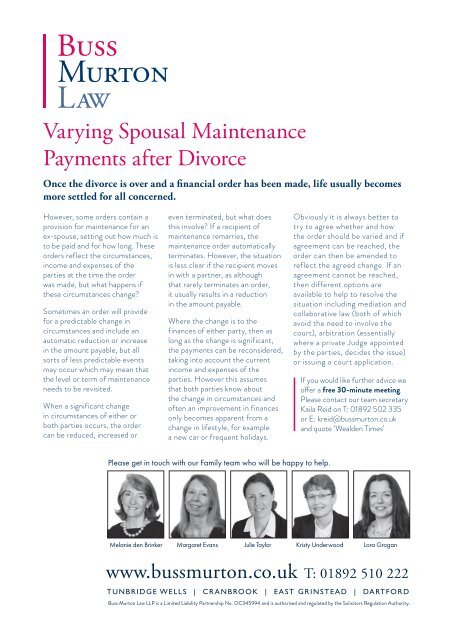Wealden Times | 189 | November 2017 | Gift supplement inside
Wealden Times - The lifestyle magazine for the Weald
Wealden Times - The lifestyle magazine for the Weald
Create successful ePaper yourself
Turn your PDF publications into a flip-book with our unique Google optimized e-Paper software.
Varying Spousal Maintenance<br />
Payments after Divorce<br />
Once the divorce is over and a financial order has been made, life usually becomes<br />
more settled for all concerned.<br />
However, some orders contain a<br />
provision for maintenance for an<br />
ex-spouse, setting out how much is<br />
to be paid and for how long. These<br />
orders reflect the circumstances,<br />
income and expenses of the<br />
parties at the time the order<br />
was made, but what happens if<br />
these circumstances change?<br />
Sometimes an order will provide<br />
for a predictable change in<br />
circumstances and include an<br />
automatic reduction or increase<br />
in the amount payable, but all<br />
sorts of less predictable events<br />
may occur which may mean that<br />
the level or term of maintenance<br />
needs to be revisited.<br />
When a significant change<br />
in circumstances of either or<br />
both parties occurs, the order<br />
can be reduced, increased or<br />
even terminated, but what does<br />
this involve? If a recipient of<br />
maintenance remarries, the<br />
maintenance order automatically<br />
terminates. However, the situation<br />
is less clear if the recipient moves<br />
in with a partner, as although<br />
that rarely terminates an order,<br />
it usually results in a reduction<br />
in the amount payable.<br />
Where the change is to the<br />
finances of either party, then as<br />
long as the change is significant,<br />
the payments can be reconsidered,<br />
taking into account the current<br />
income and expenses of the<br />
parties. However this assumes<br />
that both parties know about<br />
the change in circumstances and<br />
often an improvement in finances<br />
only becomes apparent from a<br />
change in lifestyle, for example<br />
a new car or frequent holidays.<br />
Obviously it is always better to<br />
try to agree whether and how<br />
the order should be varied and if<br />
agreement can be reached, the<br />
order can then be amended to<br />
reflect the agreed change. If an<br />
agreement cannot be reached,<br />
then different options are<br />
available to help to resolve the<br />
situation including mediation and<br />
collaborative law (both of which<br />
avoid the need to involve the<br />
court), arbitration (essentially<br />
where a private Judge appointed<br />
by the parties, decides the issue)<br />
or issuing a court application.<br />
If you would like further advice we<br />
offer a free 30-minute meeting.<br />
Please contact our team secretary<br />
Kaila Reid on T: 0<strong>189</strong>2 502 335<br />
or E: kreid@bussmurton.co.uk<br />
and quote ‘<strong>Wealden</strong> <strong>Times</strong>’<br />
Please get in touch with our Family team who will be happy to help.<br />
Melanie den Brinker Margaret Evans Julie Taylor Kristy Underwood Lora Grogan<br />
www.bussmurton.co.uk T: 0<strong>189</strong>2 510 222<br />
TUNBRIDGE WELLS | CRANBROOK | EAST GRINSTEAD | DARTFORD<br />
Buss Murton Law LLP is a Limited Liability Partnership No. OC345994 and is authorised and regulated by the Solicitors Regulation Authority.


















